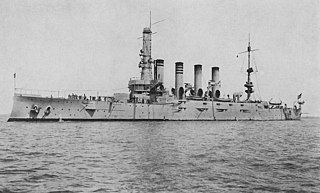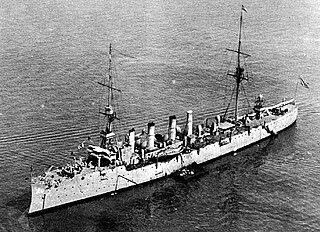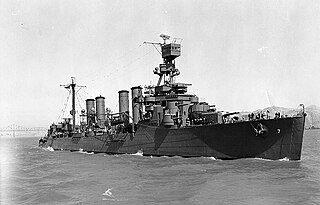
USS New Orleans was a United States Navy protected cruiser of the New Orleans class.

The first USS West Virginia (ACR-5/CA-5), also referred to as "Armored Cruiser No. 5", and later renamed Huntington, was a United States Navy Pennsylvania-class armored cruiser.

The third USS Charleston (C-22/CA-19) was a United States Navy St. Louis-class protected cruiser. She was launched 23 January 1904 by Newport News Shipbuilding and Dry Dock Co., Newport News, Virginia, sponsored by Miss Helen Whaley Rhett, and commissioned on 17 October 1905, Captain Cameron McRae Winslow in command. She was reclassified CA-19 on 17 July 1920.

USS Colorado (ACR-7), also referred to as "Armored Cruiser No. 7", and renamed USS Pueblo (CA-7) in 1916, was a United States Navy Pennsylvania-class armored cruiser. She was the second US Navy ship named Colorado, and the first to be named after the State of Colorado. The first, Colorado, was named for the Colorado River.

USS Chester (CS-1/CL-1) of the United States Navy was the first scout cruiser (CS) built for the Navy. In 1920, she was reclassified as a light cruiser (CL). She was launched on 26 June 1907, by Bath Iron Works, Bath, Maine, sponsored by Miss D. W. Sproul, and commissioned on 25 April 1908. She was named in honor of Chester, Pennsylvania. In July 1928, long since decommissioned, her name was changed to USS York, in honor of York, Pennsylvania.

USS Raleigh (C-8) was a United States Navy protected cruiser of the Cincinnati class, commissioned in 1894 and in periodic service until 1919.

USS Birmingham (CS-2/CL-2), named for the city of Birmingham, Alabama, was a Chester-class scout cruiser, reclassified a light cruiser in 1920. Entering service in 1908, the ship became known for the first airplane takeoff from a ship in history in 1910. During World War I, Birmingham escorted convoys across the Atlantic. The cruiser was decommissioned in 1923 and sold for scrap in 1930.

The USS St. Louis (C-20/CA-18), was the lead ship of her class of protected cruisers in the United States Navy. St. Louis was launched on 6 May 1905 by the Neafie & Levy Company, of Philadelphia, Pennsylvania. She was sponsored by Miss Gladys Bryant Smith and commissioned on 18 August 1906 with Captain Nathaniel R. Usher in command.

The first USS Philip (DD–76) was a Wickes-class destroyer in the United States Navy during World War I, later transferred to the Royal Navy as HMS Lancaster. She was named for John Woodward Philip.

USS Denver (C-14/PG-28/CL-16) was the lead ship of her class of protected cruisers in the United States Navy. She was the first Navy ship named for the city of Denver, the capital of Colorado.

USS Des Moines (C-15/PG-29/CL-17) was a protected cruiser of the Denver class in the United States Navy during World War I. She was the first Navy ship named for the city of Des Moines, Iowa.

USS Chattanooga (C-16/PG-30/CL-18) was a Denver-class protected cruiser in the United States Navy during World War I. She was the second Navy ship named for the city of Chattanooga, Tennessee.

USS Galveston (C-17/PG-31/CL-19) was a Denver-class protected cruiser in the United States Navy during World War I. She was the first Navy ship named for the city of Galveston, Texas.

USS Tacoma (C-18/PG-32/CL-20) was a Denver-class protected cruiser in the United States Navy during World War I. She was the second Navy ship named after the city of Tacoma, Washington.

USS Salem (CS-3/CL-3), Scout Cruiser No. 3, was a Chester-class scout cruiser of the United States Navy. She was the first Navy ship named for the city of Salem, Massachusetts.

USS Raleigh (CL-7) was the fourth Omaha-class light cruiser, originally classified as a scout cruiser, built for the United States Navy. She was the second Navy ship named for the city of Raleigh, North Carolina, the first being the protected cruiser Raleigh, commissioned in 1894, and decommissioned in 1919.

The second USS Marblehead (C-11/PG-27) was a Montgomery-class unprotected cruiser in the United States Navy, authorized in the naval appropriations bill of September 7, 1888. Marblehead served in the Spanish–American War and World War I, and was the last ship of her class in service.

The second USS Trippe (DD-33) was a Paulding-class destroyer in commission in the United States Navy from 1911 to 1919. She was named for Lieutenant John Trippe. She saw service during World War I.

The second USS Milwaukee (C-21) was a St. Louis-class protected cruiser in the United States Navy. Entering service in 1906, Milwaukee was deployed to the Pacific Ocean. On 13 January 1917, while aiding a grounded submarine, the cruiser grounded herself. The ship was decommissioned and sold for scrap in 1919.

USS Topeka (PG-35) was a gunboat of the United States Navy.





















